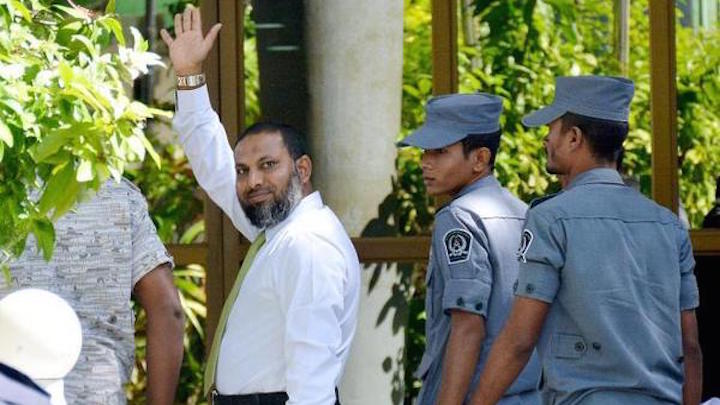Adhaalath Party leader Sheikh Imran Abdulla’s calls on President Abdulla Yameen to negotiate with the opposition during an anti-government demonstration in May constitutes terrorism, state prosecutors insisted today.
Imran’s terrorism trial, which resumed today after a five-month hiatus, saw heated exchanges between the presiding judge and defence lawyers. Imran is accused of inciting violence at the historic, 20,000-strong May Day rally.
He was charged under article two of the 1990 Anti-Terrorism Act, which states that promoting fear amongst the public or causing destruction of property are acts of terrorism.
At today’s hearing, state prosecutors argued that parts of Imran’s speech, including calling for protesters to perform the dusk prayer at the Islamic Centre – located in front the restricted Republic Square area in Malé – constitutes terrorism.
In several testy exchanges, Judge Abdul Bari Yousuf asked lawyer Ali Zahir “not to give a religious sermon” whilst former Attorney General Husnu Suood was asked to apologise or be expelled from the courtroom.
Bari was presiding after a three-judge panel assigned to the case was dissolved hours before the hearing.
Prosecutor Aishath Fazna Hussain meanwhile highlighted seven points from Imran’s May Day speech, including his assertion that President Abdulla Yameen had no choice but to sit down for talks with the opposition.
The other points included Imran’s call for protesters to sit tight until other arrangements have been made, his call for protesters to bring an end to the government’s “tyranny,” and allegations levelled at then-Tourism Minister Ahmed Adeeb and then-Police Commissioner Hussain Waheed over the disappearance of journalist Ahmed Rilwan, the brutal murder of MP Dr Afrasheem Ali, and the “framing” of former Defence Minister Mohamed Nazim.
Fazna argued that Imran’s statements were intended as a threat to the government, stressing that protesters clashed with police later that night, causing injuries to two police officers.
But Suood said Imran’s speech was aimed at politicians without any ill will. Imran cannot be prosecuted based on the passion and emotion in his speech, Suood told the court.
Judge Bari asked the defendant about his speech, but cut off Imran repeatedly and told him not to make “political” statements.
The judge also demanded an apology from Suood after he asked the judge whether he was angry. Faced with the threat of expulsion from the courtroom, the former attorney general apologised.
Zahir meanwhile attempted to convince the judge that Imran’s remarks could not constitute an act of terrorism. However, he was also interrupted by the judge and asked not to give religious sermons.
Zahir is also a senior member of the religious conservative party.
The May Day rally saw a record turnout with protesters calling on the government to release former President Mohamed Nasheed and ex-Defence Minister Nazim.
Imran was initially arrested on the night of May 1 and released after 27 days.
He was arrested for a second time on June 1 and charged with terrorism. The court at the time ordered Imran to be held in remand detention for the duration of the trial. The trial had remained stalled after a single hearing when two of the three presiding judges were promoted to the High Court on June 8.
In July, Imran was transferred from a remand centre to a high security prison on Maafushi Island. On August 5, the chief judge of the criminal court, Abdulla Mohamed, transferred Imran to house arrest, citing health concerns.
But Judge Bari held a surprise hearing the next day and ordered Imran be taken back into state custody. He cited findings in a police intelligence report which was not shared with defence lawyers.


















